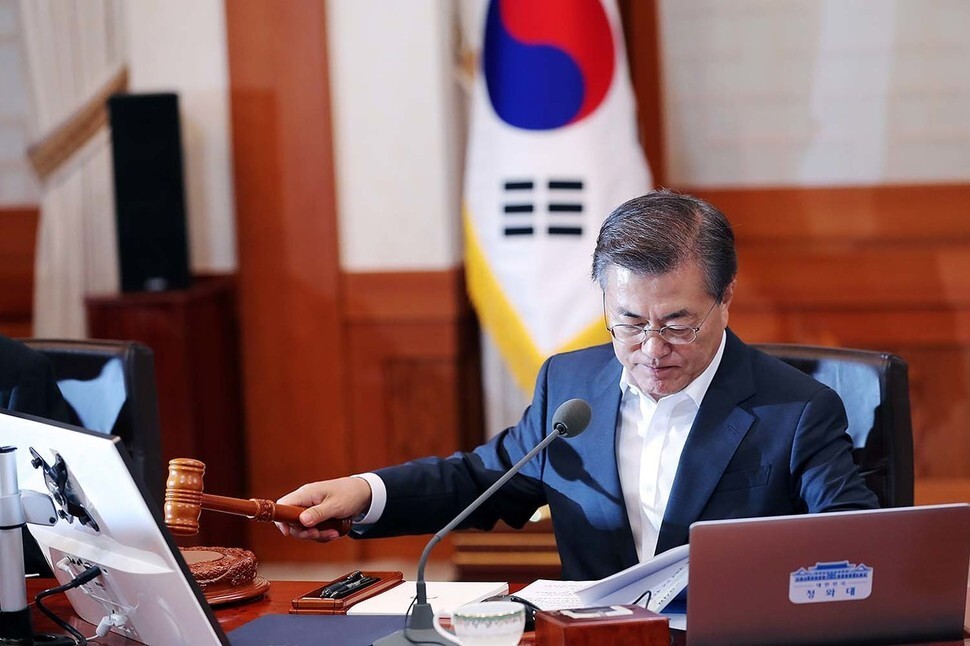hankyoreh
Links to other country sites 다른 나라 사이트 링크
Is Moon staying mum on N. Korea because of “strategic patience” or because he is out of options?

As tensions increase on the Korean Peninsula because of North Korea and the US’s war of words, South Korean President Moon Jae-in remains tight-lipped. His silence is the result of the lack of viable options, analysts say, even though Moon has ordered officials to “look into all options” to relieve tensions on the Korean Peninsula. Some expect that Moon will use his address on Aug. 15, the day marking South Korea’s liberation from the Japanese colonial occupation, to comment on recent developments.
In response to questions about Moon’s prolonged silence on Aug. 11, a senior Blue House official explained that Moon has concluded that butting into the US and North Korea’s heated dispute would not be wise, even on a strategic level. “We are giving careful thought to the significance for security of President Moon getting involved in the strident language being exchanged by North Korea and the US,” the official said during a meeting with reporters. “We are strategically considering when and how it would be effective” for Moon to address the situation, the same official said, adding that Moon was wrestling with how much to say about issues on the Korean Peninsula, including a possible message to North Korea, in his Liberation Day address on Aug. 15.
During a meeting with his aides and senior secretaries on Aug. 10, Moon gave orders to “look into all options necessary” for easing tensions, but the fact is that, under the present circumstances, the Moon administration has few cards up its sleeve. While he was running for president, Moon announced a plan for the South Korean government to play a leading role in denuclearizing the Korean Peninsula by using inter-Korean relations as leverage over the US and China. Moon reaffirmed this by announcing his Berlin Declaration according to plan, even though North Korea had test launched its Hwasong-14 ICBM two days before, on July 4. But circumstances are moving in an entirely different direction from what Moon had intended.
North Korea has been lobbing inflammatory remarks at the US while disregarding the proposals Seoul made on Aug. 17 for military talks and for Red Cross talks aimed at organizing reunions for families divided by the Korean War, dismissing those proposals as “lacking sincerity.” Unable to kickstart dialogue, the Moon administration can do little but participate in the harsh pressure and sanctions on North Korea worked out in deliberations with the US and Japan in an effort to resolve the North Korean nuclear and missile issues.
“North Korea and the US are waging a war of words, but it is South Korea that has to suffer the consequences. Right now, we ought to be coming up with ways to find a breakthrough, but the sad fact is that we don’t have any cards to play,” said Kim Yeon-cheol, a professor at Inje University.
“There are hardly any ways for us to intervene. Since North Korea and the US have created this crisis and are watching for vulnerabilities, South Korea could make things weird if it jumps in at the wrong time,” said a senior government official who asked to remain anonymous. The South Korean government’s best option, the official said, is to stay calm and ready while waiting for North Korea to feel the need to turn to dialogue.
By Kim Ji-eun and Jung Yu-gyung, staff reporters
Please direct questions or comments to [english@hani.co.kr]

Editorial・opinion
![[Guest essay] The real reason Korea’s new right wants to dub Rhee a founding father [Guest essay] The real reason Korea’s new right wants to dub Rhee a founding father](https://flexible.img.hani.co.kr/flexible/normal/500/300/imgdb/original/2024/0423/8317138574257878.jpg) [Guest essay] The real reason Korea’s new right wants to dub Rhee a founding father
[Guest essay] The real reason Korea’s new right wants to dub Rhee a founding father![[Column] ‘Choson’: Is it time we start referring to N. Korea in its own terms? [Column] ‘Choson’: Is it time we start referring to N. Korea in its own terms?](https://flexible.img.hani.co.kr/flexible/normal/500/300/imgdb/original/2024/0423/3617138579390322.jpg) [Column] ‘Choson’: Is it time we start referring to N. Korea in its own terms?
[Column] ‘Choson’: Is it time we start referring to N. Korea in its own terms?- [Editorial] Japan’s rewriting of history with Korea has gone too far
- [Column] The president’s questionable capacity for dialogue
- [Column] Are chaebol firms just pizza pies for families to divvy up as they please?
- [Column] Has Korea, too, crossed the Rubicon on China?
- [Correspondent’s column] In Japan’s alliance with US, echoes of its past alliances with UK
- [Editorial] Does Yoon think the Korean public is wrong?
- [Editorial] As it bolsters its alliance with US, Japan must be accountable for past
- [Guest essay] Amending the Constitution is Yoon’s key to leaving office in public’s good graces
Most viewed articles
- 1[Column] ‘Choson’: Is it time we start referring to N. Korea in its own terms?
- 2Opposition calls Yoon’s chief of staff appointment a ‘slap in the face’
- 3[Guest essay] The real reason Korea’s new right wants to dub Rhee a founding father
- 4Senior doctors cut hours, prepare to resign as government refuses to scrap medical reform plan
- 5Why Korea shouldn’t welcome Japan’s newly beefed up defense cooperation with US
- 6New AI-based translation tools make their way into everyday life in Korea
- 7[Editorial] Japan’s rewriting of history with Korea has gone too far
- 8Terry Anderson, AP reporter who informed world of massacre in Gwangju, dies at 76
- 9[Column] Has Korea, too, crossed the Rubicon on China?
- 10[Column] The clock is ticking for Korea’s first lady